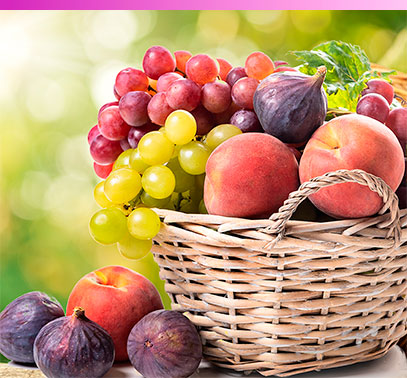
Why fruit doesn't make you fat despite having sugar: the debunked myth
The belief that fruit makes you gain weight due to its sugar content is a myth. Most of the fruit is water, and its fiber slows down sugar absorption. Additionally, compared to Maria cookies, a large apple provides fewer calories. Fruit should be part of healthy diets (fruits, vegetables, and whole grains) and a good lifestyle, according to WHO recommendations. Nutrition experts like Julio Basulto advocate for its role in obesity prevention. Debunking false ideas, it is advised to consume fresh fruit and limit fruit juices.
Healthy Lifestyle
A healthy lifestyle involves several actions that contribute to overall well-being. These actions include regular exercise, maintaining a proper weight, not smoking, and moderating alcohol consumption.
Benefits of a Healthy Diet
A healthy diet provides numerous health benefits:
- It can help you live longer.
- It contributes to maintaining healthy skin, teeth, and eyes.
- It supports muscle development and strength.
- It stimulates the immune system.
- It promotes bone strength.
- It reduces the risk of heart disease, type 2 diabetes, and certain types of cancer.
Adopting a healthy lifestyle can make a difference in your quality of life and in preventing chronic diseases, improving overall well-being, and increasing longevity.
Fruit and the Myth of Weight Gain Due to Sugar
There are many myths surrounding fruit consumption and its potential relationship with weight gain. One of the main myths is that fruit causes weight gain because of its sugar content. However, it is essential to understand that fruit contains natural sugars, which are different from the added or refined sugars found in processed foods.
Sugar content in fruit
It is true that fruit contains sugar, but there is no need to be alarmed by this fact. The sugar present in fruit is known as intrinsic sugars, which occur naturally in foods. These sugars combine with other components of the fruit, such as fiber and water, which slows down their absorption in the body. This is beneficial as it prevents spikes in blood sugar levels and provides a gradual release of energy.
High water content in fruit
Another important factor to consider is the high water content in fruit. Most of the fruit is composed of water, which contributes to its low caloric content and provides a feeling of fullness. This means that when consuming fruit, we are mainly ingesting water and not empty calories. Additionally, the hydration provided by fruit is essential for the proper functioning of the body.
The role of fiber in fruit
The fiber present in fruit also plays a fundamental role. Fiber acts as a kind of “filter” that slows down the passage of sugars into the intestine, preventing rapid absorption. Moreover, fiber provides a feeling of fullness, which helps control appetite and keeps us satisfied for a longer time. This is crucial in a weight loss diet as it reduces caloric intake without causing hunger.
Fruit and Comparison with Other Foods
Fruit is often avoided due to the myth that it causes weight gain because of its sugar content. However, when compared to other foods, interesting data emerges that debunk this belief.
Fruit vs. Maria cookies
A clear example of this comparison is an apple compared to traditional Maria cookies. While a large apple may contain around 20 grams of sugar, it has fewer calories than just five cookies. This is because most of the fruit is water, which contributes to its low caloric content. Furthermore, fruit offers additional benefits compared to traditional cookies. It contains fiber, which slows down the absorption of sugars in the body. This fiber creates a feeling of fullness, preventing spikes in blood sugar levels, and contributes to a greater sense of satisfaction after eating. Therefore, if you are looking for a healthier and more satisfying option, fruit is a much more recommendable choice than cookies.
Rapid sugar absorption in ultra-processed foods
On the other hand, it is important to consider that ultra-processed foods contain sugars that are quickly absorbed in the body. This is because these foods have undergone industrial processes that alter their original composition.
In contrast, fruit is a natural and fresh food with a beneficial nutritional balance. Its sugar content falls within what is known as “intrinsic sugars,” which are absorbed more slowly in the body due to their fiber and high water content. This difference in sugar absorption is crucial for maintaining a balanced metabolism and preventing negative health effects, such as weight gain.
Fruit in the Diet and Weight Loss
Fruit plays a fundamental role in weight loss diets due to its low caloric content and high water content. Additionally, the fiber in fruit generates a feeling of fullness, helping to control appetite and preventing snacking between meals. It is essential to note that fruit does not cause weight gain when consumed appropriately as it provides essential nutrients for the body and contributes to a balanced diet.
The importance of including fruit in a weight loss diet
When aiming to lose weight healthily, it is essential to include fruits in the meal plan. These foods are rich in vitamins, minerals, and antioxidants, essential elements for proper body function. Furthermore, fruit is a natural energy source that helps satisfy hunger without adding excess calories.
Fruit is also low in saturated fats and cholesterol, making it an ideal choice for those concerned about their cardiovascular health. As natural foods, they do not contain additives or artificial preservatives that may be harmful to the body.
The contribution of water in fruit
One of the main aspects to highlight is the high water content in fruit. This helps maintain proper hydration and provides a feeling of fullness that prevents overeating. Additionally, the water in fruit aids in the elimination of toxins and facilitates proper digestive function.
The role of fiber in weight loss
Fiber is another key component in fruit that plays an important role in weight loss. This substance not only helps regulate intestinal transit but also slows down the absorption of sugars in the body. This prevents spikes in blood glucose levels and helps maintain stable energy levels, avoiding the sensation of hunger between meals. Moreover, fiber increases the digestion time, leading to a feeling of fullness and reduced food intake. This is beneficial for weight control as it prevents excessive calorie intake.
WHO recommendations on sugar consumption
The World Health Organization (WHO) recommends limiting the intake of added sugars, present in ultra-processed foods, and prioritizing the consumption of natural sugars, such as those found in fruit. These intrinsic sugars are accompanied by fiber and other nutrients that slow down their absorption, making them healthier for the body. It is advised to consume at least five servings of fresh fruits and vegetables daily, with a preference for vegetables. Additionally, it is preferable to opt for fresh fruit consumption over fruit juices, as the latter may contain added sugars and lack the fiber found in whole fruit.
Expert opinions and studies on the relationship between fruit and weight
Julio Basulto and his defense of fruit as a healthy food
Julio Basulto, a recognized nutrition expert, strongly advocates that fruit is a healthy food and that its consumption is not related to weight gain. Basulto argues that fruit is mainly water and contains fiber, which slows down the absorption of sugars in the body. Furthermore, he highlights that the type of sugar present in fruit is different from that found in ultra-processed foods, preventing negative health effects related to rapid sugar absorption. Basulto has written numerous articles and books highlighting the benefits of including fruit in the daily diet. He also presents scientific evidence supporting his stance, citing studies that link fruit consumption to a lower risk of obesity. His approach is based on promoting a balanced and varied diet, where fruit plays a fundamental role and.
Other expert opinions on nutrition
In addition to Basulto, other nutrition experts also support the idea that fruit does not cause weight gain when consumed properly. These professionals assert that fruit consumption is not related to overweight and obesity issues since its sugar content is natural and different from that of processed foods. They recommend including fruit freely in daily eating habits, even in weight loss diets. According to them, the problem of overweight does not lie in fruit consumption but rather in excessive consumption of unhealthy, high-calorie foods. They also emphasize the importance of prioritizing the consumption of fresh fruit over fruit juices, as juices may have a higher concentration of sugar and a lower amount of fiber.
Myths and recommendations about fruit consumption
Many myths and misconceptions surround fruit consumption, especially regarding its alleged association with weight gain due to its sugar content. However, it is important to clarify some mistaken ideas and provide evidence-based recommendations.
Dispelling ideas like gaining weight after meals
It is common to hear that eating fruit after meals can contribute to weight gain. However, there is no scientific basis to support this claim. Due to its high water and fiber content, fruit helps create a feeling of fullness and slows down the digestion of sugars present in it. Therefore, there is no reason to fear consuming fruit after a main meal.
Recommendations on fruit and vegetable consumption variety
The World Health Organization (WHO) recommends consuming at least five servings of fresh fruits and vegetables daily as part of a healthy diet. Prioritizing the consumption of vegetables is essential due to their lower sugar content and higher nutrient content. It is important to vary the chosen fruits and vegetables, as each provides different nutrient profiles and health benefits.
- Opt for seasonal fruits: Consuming seasonal fruits ensures their freshness and higher nutrient availability. Additionally, they often have better flavor and are more economical.
- Combine different fruit colors: Each color in fruits indicates the presence of different antioxidants and essential nutrients. By combining different colors, we ensure a greater variety of health benefits.
- Prefer whole fruits over juices: Although fruit juices can be an occasional option, it is preferable to consume whole fruits due to their higher fiber content, which helps regulate sugar absorption and provides a greater sense of fullness.
The preference for fresh fruit over fruit juices
While fruit juices can be refreshing and provide some nutrients, it is essential to consider that excessive consumption can lead to a higher intake of sugars and a lower amount of fiber. Additionally, processing fruit to obtain juice can lead to the loss of some beneficial fiber and other components. Therefore, it is recommended to prioritize the consumption of fresh fruit over packaged juices to obtain all the nutritional benefits that fruit provides.
More information:



